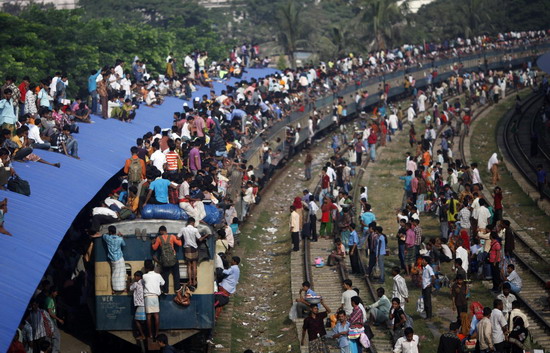Economy
Traffic jam costs Bangladesh $1.7 billion
Updated: 2010-12-30 13:55
(Xinhua)
|
 In this November 16, 2010 file photo, passengers ride on top of an overcrowded train at a railway station in Dhaka. [Photo/Agencies] |
DHAKA - Traffic congestion in Bangladesh's capital Dhaka causes a loss of about $1.68 billion a year, an official said.
| ||||
"Annual loss caused by traffic congestion in Dhaka city is approximately $1.68 billion," he was quoted as saying.
He said traffic gridlock causes economic losses by eating up travel time and burning of excess fuel. It also causes environmental damage and road accidents.
Salehuddin blamed lack of transport infrastructure, poor traffic management, illegal car parking, too little footpath and pedestrians' facility and absence of separate lane for bus for the city's nagging traffic jam.
Also contributes to it is the mixed traffic flow of motorized and non-motorized vehicles on the road, said Salehuddin.
To reduce congestion and thus economic losses, public transport systems, especially bus services, must be improved by allocating a separate lane for passenger bus in the capital, he said.
Earlier in this year, another study report said that traffic congestion in Dhaka eats up 195.55 billion tanka ($2.79 billion) a year.
Senior officials of the country's Roads and Highways Department carried out the study which finds that about 3.2 million business hours are lost every day, which is about one hour per working people.
According to Bangladesh Road Transport Authority, about 115,000 registered private cars, 10,000 taxicabs and 50,000 buses and minibuses are currently running on different routes in the capital.
E-paper

Ear We Go
China and the world set to embrace the merciful, peaceful year of rabbit
Preview of the coming issue
Carrefour finds the going tough in China
Maid to Order
Specials

Mysteries written in blood
Historical records and Caucasian features of locals suggest link with Roman Empire.

Winning Charm
Coastal Yantai banks on little things that matter to grow

New rules to hit property market
The State Council launched a new round of measures to rein in property prices.




